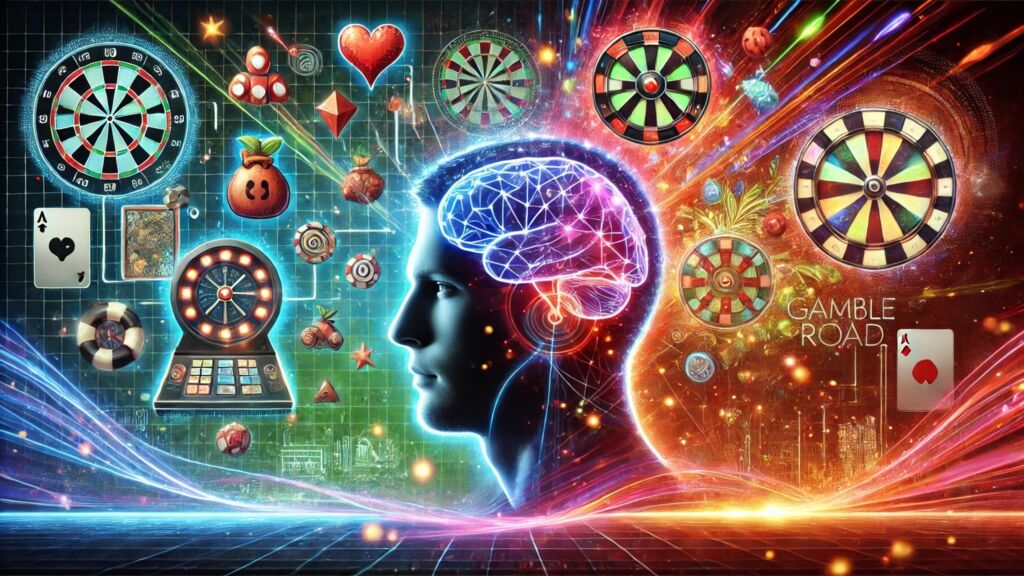The emotional journey of gambling is a critical aspect that can greatly affect how enjoyable or stressful the experience becomes. Anticipatory excitement, winning euphoria, and the sting of losses are normal experiences. However, knowing strategies to manage these emotions is essential to ensure gambling remains a positive activity.
Exploring the Emotional Dynamics of Gambling
Gambling involves a multitude of emotions. Whether it's the thrill of betting, the excitement of potential wins, or the disappointment of losses, these emotional moments are impactful. For many, they are simply part of the fun, but for some individuals, these emotional spikes can lead to destructive gambling patterns.
It's important to recognize the broad emotional spectrum linked to gambling. While positive emotions can enhance enjoyment, negative emotions such as distress or anger can become problematic when they start driving gambling habits or adversely affecting one's life.
The way emotions are experienced while gambling involves complex psychological dynamics. The reward system in our brains, which releases dopamine in response to wins or near wins, reinforces gambling actions. This can lead to a cycle of continually chasing that winning high, even amidst losses. Understanding this process is a significant step in controlling gambling emotions.
Detecting When Gambling Emotions Become Harmful
It's vital to be aware of when emotions related to gambling take a negative turn. It's not just about how intense the emotions are, but also the impact they have on one's actions and overall life quality. Look out for these signs:
- Pursuing Lost Bets: Continuing to gamble more to recuperate lost money, often driven by feelings of desperation or fear.
- Using Gambling as a Retreat: Turning to gambling to escape stressful or negative emotional states, reflecting an unhealthy coping mechanism.
- Emotional Aftermath of Losses: Experiencing intense emotions such as frustration, guilt, or sadness following losses.
- Secrecy Due to Guilt: Hiding gambling activities from loved ones suggests a feeling of loss of control.
- Ignoring Duties: Letting gambling interrupt important aspects of daily life like work or family, driven by an emotional need to engage.
- Increasing Bets for Excitement: Needing larger bets to achieve the same excitement level implies an adaptation to gambling's emotional highs.
If you recognize any of these behaviors, it's important to seek strategies to regain control over your gambling-related emotions.
Approaches to Handling Emotional Responses to Gambling
Effectively navigating gambling emotions involves using psychological insights, practical techniques, and lifestyle habits. Consider these strategies:
1. Being Mindful and Acknowledging Emotions
Central to managing gambling emotions is having self-awareness. This means tuning into your emotions before, during, and after you gamble. Consider these questions:
- What emotions am I feeling right now?
- What situations or thoughts trigger these gambling emotions?
- In what ways do these emotions influence your gambling choices?
Maintaining a journal dedicated to your gambling experiences can assist in fostering greater self-awareness. Record your feelings when you start and as you gamble, and reflect on these emotions afterward. This will help identify patterns and emotional catalysts associated with your gambling activities.
For instance, you might find that stressful periods push you toward gambling more. Recognizing such triggers helps in managing them effectively.
2. Setting Limits and Boundaries
Setting clear boundaries is pivotal to maintaining control over both gambling activities and their emotional impact. These include:
- Monetary Constraints: Decide beforehand how much you can afford to spend or lose and comply strictly. Restrict gambling to leisure funds.
- Allocating Time: Outline a precise timeframe for gambling sessions to prevent them from dominating your day.
- Loss Cap: Predefine how much loss you find acceptable within a session and pause when reached.
These boundaries must be determined calmly, ahead of gambling, and treated as firm rules. Respecting set boundaries minimizes emotional flux and discourages impulsive reactions.
Example Scenario: Take John, who sets a $200 monthly budget, organized weekly into $50 increments, maintaining financial prudence and emotional balance. Additionally, he caps his playtime at 2 hours per session, safeguarding other responsibilities.
3. Developing Coping Mechanisms
Adopting robust coping methods is crucial to managing gambling-related emotions and impulses, especially after losses. Potential strategies include:
- Practicing Mindfulness: Stay present and recognize emotions non-judgmentally, thus tempering impulsivity.
- Relaxation Methods: Techniques such as deep breaths, visualization, and muscle relaxation help ease tension.
- Engaging in Exercise: Regular workouts relieve stress and elevate mood, often alleviating gambling drives.
- Exploring Hobbies: Activities that offer joy beyond gambling can serve as healthier emotional outlets.
When urged by stress or negative emotions to gamble, resort to these alternative coping strategies. For instance, substitute gambling cravings with a 15-minute meditation or an invigorating walk.
4. Seeking Social Support
Social connections are instrumental in managing the emotional tides of gambling. Confiding in a trustworthy person provides invaluable support, insight, and motivation. Help can be found through:
- Family and Friends: Confiding in empathetic loved ones offers emotional solace and practical aid.
- Support Circles: Groups like Gamblers Anonymous offer community backing and shared experiences.
- Counseling Services: Experienced therapists offer structured strategies to mitigate gambling emotions and habits, with CBT proving especially effective in correcting gambling-related thought distortions.
Avoid isolating yourself with gambling-induced emotions. Seeking help reflects strength and a proactive approach to managing gambling. Sharing challenges in a supportive environment normalizes experiences and gleans coping insights.
5. Overcoming Distorted Thinking Patterns
Gambling often fosters distorted thinking styles which sustain problematic behavior. Common distortions include:
- “Gambler’s Fallacy”: Misbelieving previous outcomes influence future independent events.
- “Near Miss Perception”: Mistakenly viewing near wins as signs of likely success.
- “False Control Illusion”: Imagining unwarranted control over gambling outcomes breeds risky overconfidence.
- “Optimistic Bias”: Downplaying risks while overestimating success odds.
Curbing these distorted outlooks is essential for emotional regulation. Cognitive Behavioral Therapy (CBT) strategies assist by:
- Spotting Skewed Thinking: Recognize irrational gambling-related thoughts.
- Assessing Evidence: Carefully weigh facts against these thoughts.
- Adopting Realistic Thoughts: Swap distorted ideas for balanced, rational views. Instead of thinking, “I’m due for a win,” remind yourself that each game's outcome is independent of previous results.
By identifying and confronting these mental traps, you enhance your ability to control emotions related to gambling and enable yourself to make more informed decisions.
Example: Sarah, who frequently played slot machines, often succumbed to the gambler’s fallacy, believing that a win was imminent after a series of losses. Through therapy, Sarah discovered the concept of cognitive distortions and began questioning her thoughts. She started reminding herself that every slot spin is an independent event and, thus, not influenced by previous outcomes. This understanding helped her restrain the impulse to chase losses induced by the fallacy.
6. Modifications in Lifestyle for Emotional Equilibrium
Adopting a healthier lifestyle can play a crucial role in maintaining emotional well-being and minimizing triggers associated with gambling desires. Consider making the following lifestyle changes:
- Getting Enough Sleep: Proper sleep is vital for keeping emotions in check. Lack of sleep can intensify negative feelings and hamper judicious decision-making. Aim for 7-9 hours of quality sleep each night.
- Balanced Nutrition: Eating a nutritious diet is integral to overall health and emotional steadiness. Reduce caffeine and alcohol intake to avoid emotional disturbances.
- Techniques to Handle Stress: Integrate stress-relief methods into your daily regimen, such as practicing yoga or tai chi, or simply spending time outdoors. Ongoing stress can aggravate negative emotions and heighten gambling urges.
- Smart Use of Technology: Be aware of your technology consumption, especially in relation to gambling. Minimize exposure to online gambling ads and potential triggers. Consider using apps or browser extensions to block access to gambling websites if necessary.
Incorporating these lifestyle changes establishes a solid basis for better emotional handling, thereby aiding in effective management of emotions linked to gambling.
7. Relapse Prevention Strategies
Experiencing a relapse is often part of the journey overcoming problematic gambling behaviors. Establishing a relapse prevention strategy is vital for achieving sustainable recovery. Such strategies encompass:
- Recognizing Situations of High Risk: Be mindful of scenarios, locations, or emotions that may compel you to gamble, such as stress, loneliness, or proximity to a casino.
- Formulating a Relapse Prevention Plan: Devise a structured approach for times when you feel a strong urge to gamble. This might involve reaching out to a supportive individual, engaging in a distraction activity, or retreating from a risky situation posthaste.
- Support Network Development: Maintain active communication with supportive groups, mental health professionals, or trustworthy individuals who can offer encouragement and accountability.
- Frequent Self-Review: Routinely assess your gambling patterns and emotional state. Are you sticking to your limits? Are there any signs suggesting a potential relapse? Regular self-evaluation allows timely intervention.
A relapse prevention plan functions much like a fire drill, equipping you with a readiness plan when temptation arises. For instance, if stress is a prompt, your strategy could encompass an array of alternative activities to engage in when stress elevates, such as visiting a gym, phoning a companion, or meditating.
Seeking Professional Help
While self-regulation approaches are beneficial, professional intervention is often indispensable for individuals grappling with significant gambling-related emotional difficulties. Consider professional assistance if:
- Self-regulation methods fail to work.
- Gambling contributes to substantial agitation or functional disruption in your life.
- You’re experiencing symptoms of concurrent mental health disorders such as depression or anxiety.
- You have thoughts about harming yourself or others.
Addiction treatment specialists can offer comprehensive assessments, tailored treatment approaches, and continuous support. Potential treatment avenues are:
- Cognitive Behavioral Therapy (CBT): Aids in identifying and altering harmful thought patterns and actions linked to gambling.
- Dialectical Behavior Therapy (DBT): Emphasizes emotional control, tolerating distress, and improving interpersonal skills.
- Medicinal Intervention: At times, medications may be employed to address concurrent mental health conditions or lessen gambling urges.
- Inpatient Treatment: For severe cases, inpatient treatment centers deliver intensive therapy and aid within a structured setting.
Pursuing professional support is a mark of resilience and dedication to recovery. It avails access to specialized resources and assistance that can enhance recovery results markedly.
Conclusion: Cultivating Emotional Understanding while Gambling
Managing your gambling-associated emotions does not entail eradicating emotions completely, but rather fostering emotional understanding regarding gambling. It entails discerning your emotional stimuli, acknowledging problematic tendencies, and enacting strategies to preserve emotional steadiness and command. By nurturing self-awareness, establishing boundaries, conjuring coping strategies, seeking assistance, challenging mental distortions, and adjusting lifestyles healthily, individuals can traverse gambling's emotional realm more healthfully and sustainably.
Remember, gambling ought to be an amusement activity, not a source of emotional turmoil. By focusing on emotion management, individuals can enjoy gambling sensibly and mitigate its adverse effects on their lives. If you're struggling with managing your gambling-induced emotions, reaching out for assistance is a bold and significant move towards regaining command and well-being.
External Resources:



